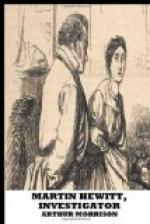“But have you searched the place?”
“Of course I have! It was twelve o’clock when I first discovered my loss, and I have been turning the place upside down ever since—I and my assistants. Every drawer has been emptied, every desk and table turned over, the very carpet and linoleum have been taken up, but there is not a sign of the drawings. My men even insisted on turning all their pockets inside out, although I never for a moment suspected either of them, and it would take a pretty big pocket to hold the drawings, doubled up as small as they might be.”
“You say your men—there are two, I understand—had neither left the office?”
“Neither; and they are both staying in now. Worsfold suggested that it would be more satisfactory if they did not leave till something was done toward clearing the mystery up, and, although, as I have said, I don’t suspect either in the least, I acquiesced.”
“Just so. Now—I am assuming that you wish me to undertake the recovery of these drawings?”
The engineer nodded hastily.
“Very good; I will go round to your office. But first perhaps you can tell me something about your assistants—something it might be awkward to tell me in their presence, you know. Mr. Worsfold, for instance?”
“He is my draughtsman—a very excellent and intelligent man, a very smart man, indeed, and, I feel sure, quite beyond suspicion. He has prepared many important drawings for me (he has been with me nearly ten years now), and I have always found him trustworthy. But, of course, the temptation in this case would be enormous. Still, I can not suspect Worsfold. Indeed, how can I suspect anybody in the circumstances?”
“The other, now?”
“His name’s Ritter. He is merely a tracer, not a fully skilled draughtsman. He is quite a decent young fellow, and I have had him two years. I don’t consider him particularly smart, or he would have learned a little more of his business by this time. But I don’t see the least reason to suspect him. As I said before, I can’t reasonably suspect anybody.”
“Very well; we will get to Chancery Lane now, if you please, and you can tell me more as we go.”
“I have a cab waiting. What else can I tell you?”
“I understand the position to be succinctly this: The drawings were in the office when you arrived. Nobody came out, and nobody went in; and yet they vanished. Is that so?”
“That is so. When I say that absolutely nobody came in, of course I except the postman. He brought a couple of letters during the morning. I mean that absolutely nobody came past the barrier in the outer office—the usual thing, you know, like a counter, with a frame of ground glass over it.”
“I quite understand that. But I think you said that the drawings were in a drawer in your own room—not the outer office, where the draughtsmen are, I presume?”




